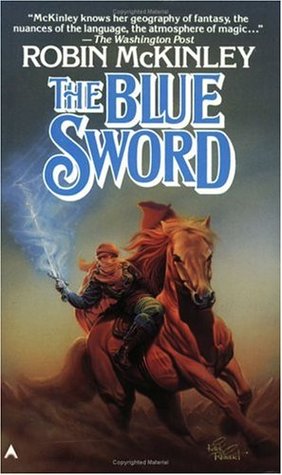Sometimes I reread a book I read as a kid/teenager and reevaluate it. Sometimes this turns out to be a mistake, but never when I read Robin McKinley.
My first experience with her books was when I was around eleven, and probably too young to really grasp all the nuances and complexities of her writing. I read The Hero and the Crown because the cover had a red-haired girl* wielding a sword, on a horse, facing a dragon. To a Lord of the Rings and Star Wars girl, this was all the incentive I needed to pick it up. I was drawn in by Robin McKinley's lyrical prose and her fascinating fantasy landscape. Naturally, after Hero, I picked up The Blue Sword, which gets me to today's review:
 |
| This is the cover of my copy. It is one of the better fantasy covers out there, in my opinion |
When the king of the Free Hillfolk, Corlath, comes to ask the Homelanders for help again their mutual enemy, the Northerners, it sets things in motion that neither Homelanders or Hillfolk could imagine.
Corlath (and some of the Hillfolk) have a sort of innate magic, or kelar, which grows stronger with emotion. As the heroine and protagonist, Harry also has this kelar, and finding out the how and why is part of the plot, so I won't spoil it. Suffice it to say that Corlath's kelar often "demands" he do strange or rash things: in this case, it tells him he needs to take Harry for the Hills. Harry's destiny is tied to both Homelanders and Hillfolk, and ultimately she must reconcile both those sides of herself, and bridge the way for others if they are to defeat the Northern hordes. If she becomes an awesome, legendary-sword wielding hero while still retaining her personality and identity, then you know you are reading a Robin McKinley novel.
What works/what I liked:
1. Harry. I can relate to her, you can relate to her, and she's authentic (minus the kelar, of course). She is a strong female character who is defined by her own personality, and acts like a real person.**
2, Robin McKinley's style and sly humor. Her use of language is lovely and easy to read. She is neither flowery or bare with her description. She never writes down to her readers, and there is no instant gratification. Her books are not typical YA.
3. Hillfolk culture. They are warriors, they use swords, they are proud and honorable, they have a wonderful relationship with their horses and other animals, and I could go on. I only wish there was more.
4. True Hero Fantasy. The Blue Sword is the real deal. Hero fantasy, as a genre, follows a young hero/chosen one from their usually unremarkable start, follows their training for greatness, and then establishes them by testing their skills/powers/heart, etc. Sometimes is is refreshing to read a book that isn't trying to be too clever.
5. Harry and Corlath's relationship. From prisoner/guest and reluctant kidnapper, to rider and king, to *spoiler* couple, they are one of my favorite fictional pairs. They manage to be equals (though Corlath is a king and Harry has the disadvantage), have disagreements, and be friends in a way that sold me. I am not a romance person, and honestly, The Blue Sword has very little romance, but I found their relationship both compelling and believable.
What didn't work/what I didn't like:
This is harder, like critiquing your friend, but here goes:
1. (See #3 above) I wanted more Hillfolk. More culture, more history, more character development outside of the main ones. I could probably read a whole book about Damar's history and not be bored.
2. (See #4) Like most hero fantasy, Harry gains a lot of her powers/abilities through it being her destiny to have them. I know I said this was one of the best parts above, but it is also one of the things I don't like as much. Harry's time training and developing her powers is not long enough, and I would have liked to see it be harder. (It's not easy, per se, but, well . . .)
3. More Aerin. I know this is why you read Hero, but in my opinion, both books could use more of that legendary figure :) After all, Hero ends with the beginning of her legendary period.
4. More Corlath. Obviously, this is Harry's story, but I love Corlath, and I would have liked to know more about him. We know the essentials (like Harry does), but he is funny and grim, and fascinating, and a great character in his own right.
5. The Northerners. They are bad, mysterious, and witchy, and they want to destroy everything, but we really don't know much more. I know this is explored elsewhere, but I would have liked to know more about them.
Overall: 4.5 out of 5 stars-It isn't as good as Hero, but it is still one of my favorite books ever!
This was actually kind of hard!
Footnotes:
*I love red hair. Always have. And sometimes cover art is accurate.
**I do not like heroines who become strong by basically acting like a man. I also don't like period piece heroines who internally rant about the unfairness of their period-correct pastimes/clothing/mores in a modern fashion. It isn't realistic, and it isn't fair to the many strong women who have lived and died in the past. That's all.
Thanks for reading, and feel free to add books you reevaluated from childhood in the comments.
No comments:
Post a Comment